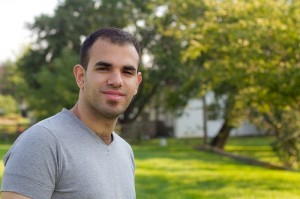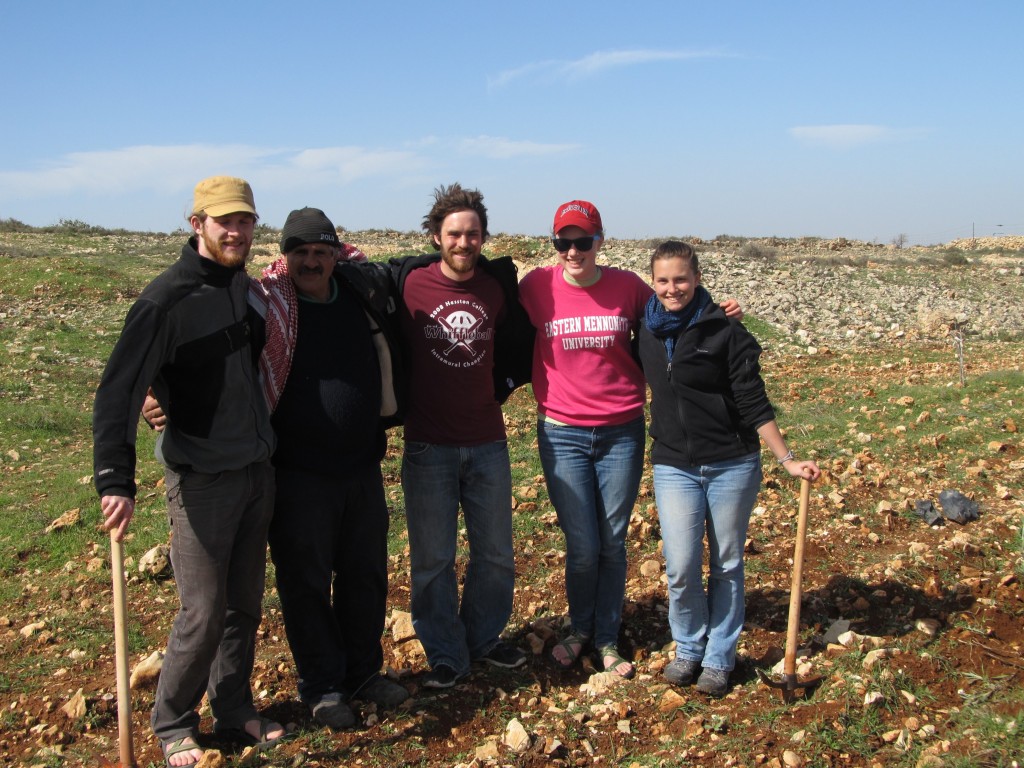A large boulder rests beside the dirt road at the entrance to the Nassar family farm southwest of Bethlehem. On it the following phrase is written, in English, German and Arabic: “We refuse to be enemies.”
It is a motto that has been put to the test over and over, most recently in May when Israeli bulldozers destroyed orchards on the farm, some with trees planted by Eastern Mennonite University groups. The family estimates that 1,500 apricot and apple trees and grapevines, many bearing fruit almost ready for harvest, were uprooted.
“They are telling us, ‘We don’t want you here. We want you to give up,’ but we’re not giving up,” said family member Bshara Nassar, a 2014 graduate of EMU’s Center for Justice and Peacebuilding. He is Christian, as is his family. “We try to separate the people from their actions. The people are not our enemies, but we don’t like their actions.”
5,000-7,000 visit annually
In the midst of their decades-long struggle the Nassar family decided to make their land a place of cooperation and understanding in the West Bank. In 2000 they formed Tent of Nations, bringing visitors from around Israel, Palestine and the world onto the farm for learning, understanding and reconciliation by hosting workshops, seminars and summer camps. Tent of Nations hosts between five and seven thousand visitors annually. They and thousands of others stay informed via the Internet.
For more than 10 years, undergraduate, alumni and seminary groups from EMU have made the farm a regular stop on their Middle East tours.
“Visiting Tent of Nations is the crown jewel of our study tours,” said Dorothy Jean Weaver, professor of New Testament at the seminary, who has led eight tours to the farm. “It’s the bright, little gem in all of the places we visit. I think most of our students leave there inspired.”
Linford Stutzman, seminary professor of culture and mission, has made the Tent of Nations farm a stop on the last eight cross-cultural study tours he and his wife, Janet, have led to the Middle East. Over the years about 300 EMU students have spent a day at the farm, often planting trees. Stutzman said that alumni who previously visited Tent of Nations often donate money to buy trees for future students to plant.
Farming as vehicle of peace
“On my first visit to Tent of Nations I was impressed with their authenticity and their commitment to not only save their land, but to use their land as a vehicle for working towards peace,” said Stutzman. “The family chooses to stay there so that they can continue to work towards what needs to happen.”

Bshara, a great grandson of the original purchaser of the land, currently lives in the United States, where he advocates for the Palestinian people and seeks to open a museum in Washington D.C. that chronicles the nakba, an Arabic word meaning “catastrophe.” It refers to the uprooting and diaspora of more than 700,000 Palestinians from the newly founded state of Israel in 1948.
“At EMU I learned that peacebuilding is about building personal relationships and that is what we are trying to do with Tent of Nations,” he said. “It made me more certain that this was what I should be doing. Conflict transformation is my passion and I do that through advocacy, by sharing the story of the Palestinian people.”
Ottoman-era land title
The struggle for the 100-acre farm near Bethlehem, purchased by Bshara’s ancestor in 1916, has gone on for nearly a quarter century. In 1991 the Israeli government declared the land to be state owned. This started a legal battle in the Israeli military courts that continues to this day and has cost the family nearly $150,000. The history of Palestine in the 20th century is one of occupation and this is reflected in the Nassar family’s documentation of their land ownership. Their original paperwork from 1916 is from the Ottoman Empire, followed by documents from the British and Jordanian governments that controlled the West Bank area before the Israelis occupied the area following the Six Days War in 1967.
Bshara’s uncle, Daoud Nassar, directs the Tent of Nations and is the usual family spokesperson, as seen in recent 23- and 3-minute videos.
In his Spring 2013 newsletter, Daoud wrote of trying to water the farm’s trees, in the absence of access to running water (reserved for Israel’s settlements): “During the winter months, we managed to collect water in our cisterns to be used in the dry summer. We managed also to plant 1,253 olive and other trees.
“With this investment in agriculture, our aim is to make the farm self-sufficient. Now there are thousands of trees growing on the farm. We are continuing cultivating land towards the valley, planting it with more trees and making it green. In the summer months, we are all busy in watering the hundreds of trees that were planted in the winter months.”
A year after these words were written, the family received a warning that their trees were on state land. The destruction came unexpectedly, while their legal appeal was still pending, with trees uprooted and their meticulously terraced fields destroyed. It is not the first time the farm’s orchards have been threatened. In 2003 members of the family stood in front of bulldozers attempting to make a road across the farm. In May the bulldozers came in the morning before anyone was aware of what was happening.
“I have been struck by the depth of the family’s faith and their commitment to non-violence,” Weaver said. “They are people who live in the most perniciously difficult circumstances.”
Not giving up
“Our situation is hard but my family has decided not to give up and leave,” Bshara said. “We have chosen not to act in a violent way, but to act in a different way.”
Because Tent of Nations has hosted visitors from around the world, the destruction of the trees quickly brought international attention, with stories appearing in news outlets from Al-Jazeera to the BBC. Supporters in the United States started an online petition to representatives in Congress and Secretary of State John Kerry, protesting the treatment of the Nassar family’s farm.
In a Facebook post on May 27, 2014, Bshara thanked those supporting Tent of Nations, adding:
I have a dream that one day we will have a truth-and-reconciliation committee and the soldiers who did it will confess and apologize for their acts. And they will be invited for a cup of tea at the same piece of land they destroyed and we will all plant trees together. Until then, let’s all work for justice, equal rights and planting love instead of hatred.
Replanting the trees
As their case continues in the courts, the Nassar family is already making plans to rebuild their orchards. They are seeking volunteers who will help them replant. Stutzman said that on the next cross-cultural trip he and Janet lead, EMU students will once again plant trees on the Nassars’ farm.
“We hope the new trees will not be in danger after the international attention brought on by the bulldozing of the original trees,” Bshara said. “But there are no guarantees. Living with no guarantees is what life is like for a Palestinian in the West Bank.”
Editor’s note: On Sept. 1, 2014, just as this article was being published, CNN reported that

Thanks for sharing your plight. God bless you with peace